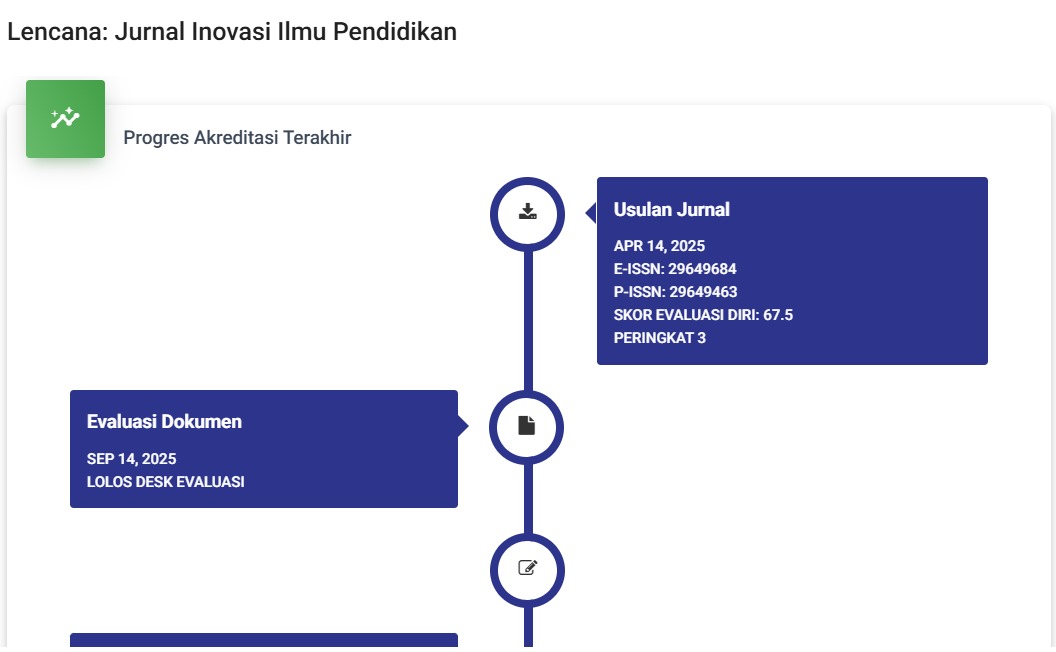Keefektifan Bimbingan Kelompok Teknik Problem Solving untuk Meningkatkan Kebiasaan Belajar Siswa SMPN 8 Denpasar
DOI:
https://doi.org/10.55606/lencana.v2i3.3727Keywords:
group guidance, problem solving, study habitsAbstract
Study habits are an important thing to pay attention to because they are one of the main components that support student achievement or learning success. However, quite a few students have poor study habits. This is reflected in the behavior of students who rarely do assignments, are not active in learning activities, do not prepare lesson materials and other behavior that indicates negative study habits. The main aim of this research is to improve the study habits of students at SMPN 8 Denpasar through a problem solving technique group guidance approach. The type of research used is quantitative research with experimental methods. The design used is one-group pretest-posttest. The instruments used are experimental guidelines prepared by researchers and tested by experts and the study habit scale used is adopted by Nawawi (2016). Subject determination uses purposive sampling. The subjects used in this research were eight students who had low study habit scores after a pretest with the study habit scale. The data analysis used is descriptive and inferential analysis in the form of the N-gain Score test and the Wilcoxon test. Based on the results of the pretest and posttest tables, there was an increase in students' study habits scores after being given the intervention, and based on the results of calculations using the SPSS Wilcoxon signed rank test. From this value it is known that 0.012 < 0.05 which means Ha is accepted. Based on the results of this analysis, it can be concluded that group guidance on problem solving techniques is effective in improving students' learning habits.
Downloads
References
Azhar, A. N., Kusnawan, A., & Miharja, S. 2017. Layanan Bimbingan Kelompok dalam Meningkatkan Kedisiplinan Belajar Siswa. Bimbingan, Penyuluhan, Konseling, dan Psikoterapi Islam, 5(1), 1–20.
Dimyati, Mujiyono. 2009. Belajar dan Pembelajaran. Jakarta: Rineka Cipta. Djaali. 2014. Psikologi Pendidikan. Jakarta: Bumi Aksara
Fredik, T. F., & Dewi, S. I. 2018. Analisis Pengaruh Promosi Melalui Media Sosial Instagram Terhadap Keputusan Pembelian. Ilmu Sosial dan Ilmu Politik, 7(2), 84–88. www.publikasi.unitri.ac.id
Lutfiah, Nurul, ‘Hubungan Kebiasaan Belajar Dan Kesulitan Belajar Dengan Prestasi Belajar Peserta Didik’, Tafahus: Jurnal Pengkajian Islam, 1.2 .2021. 186–202 <https://doi.org/10.58573/tafahus.v1i2.25>
Mawaddah, S., & Anisah, H. 2015. Kemampuan Pemecahan Masalah Matematis Siswa Pada Pembelajaran Matematika Dengan Menggunakan Model Pembelajaran Generatif (Generative Learning) Di SMP. Pendidikan Matematika, 3(2), 166–175.
Nawawi, Khoirul. 2016. “Pengaruh Kebiasaan Belajar Dan Motivasi Belajar Terhadap Hasil Belajar Siswa Kelas V Sd Gugus Dewi Sartika Dan Gugus Hasanudin Kota Tegal.” Skripsi 6.
Purwono, B. (2010). Kebiasaan Belajar Sumbangan Terbesar Dalam Prestasi Belajar. Tersedia: http://www. smandapura. sch. id.
Resti, D. S., Putra, F., & Chandra, Y. (2023). BIMBINGAN KELOMPOK TEKNIK PROBLEM SOLVING DALAM MENINGKATKAN KETERCAPAIAN TUGAS PERKEMBANGAN PESERTA DIDIK SMA. Jurnal Bikotetik (Bimbingan dan Konseling: Teori dan Praktik), 7(02), 95-103.
Rosidah, A. 2016. Bimbingan Kelompok Melalui Teknik Problem solving Untuk Meningkatkan Penyesuaian Diri Siswa Terisolir. Fokus Konseling, 2(2), 136–143. http://ejournal.stkipmpringsewu-lpg.ac.id/index.php/fokus
Sa’adah, N., Samsudin, A., & Alawiyah, T. 2022. Penerapan Teknik Diskusi Kelompok Dalam Bimbingan Kelompok Terhadap Motivasi Belajar Siswa Di Masa Pandemi COVID-19. FOKUS (Kajian Bimbingan & Konseling Dalam Pendidikan), 5(4), 327–335. https://doi.org/10.22460/fokus.v5i4.8497
Siagian, R.E.F. 2015. Pengaruh Minat dan Kebiasaan Belajar Siswa terhadap Prestasi Belajar matematika. Jurnal Formatif, 02 (02): 122.131.
Slameto. 2010. Belajar dan Faktor-faktor yang Mempengaruhi. Jakarta: Rineka Cipta
Sudjana, N. 2014. Dasar-dasar Proses Belajar Mengajar. Bandung: Sinar Baru Algesindo.
Sudjana, Nana. 2014. Penilaian Hasil Proses Belajar Mengajar. Bandung: PT. Remaja Rosdakarya.
Sugiyono. (2016). Metode Penelitian Kuantitatif, Kualitatif dan R&D. Bandung: PT Alfabet.
Sugiyono. 2010. Statistik untuk Penelitian. Bandung: Alfabeta.
Ulfa, M., & Suarningsih, N. K. 2018. Efektivitas Layanan Konseling Kelompok Melalui Teknik Self Management Untuk Meningkatkan Kebiasaan Belajar Siswa Kelas Viii Smpn 1 Kapontori. Psikologi Konseling, 12(1), 120–132. https://doi.org/10.24114/konseling.v12i1.12181
Downloads
Published
How to Cite
Issue
Section
License
Copyright (c) 2024 Lencana: Jurnal Inovasi Ilmu Pendidikan

This work is licensed under a Creative Commons Attribution-ShareAlike 4.0 International License.








